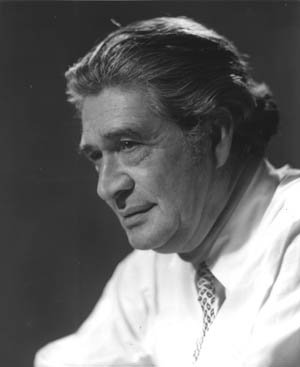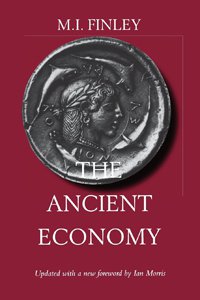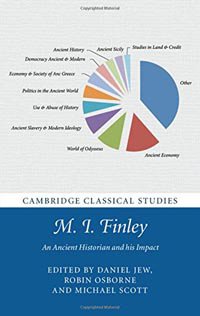
The print version of this article can be downloaded as a PDF file.
Robin Osborne is Professor of Ancient History at the University of Cambridge. He was elected a Fellow of the British Academy in 2006.
There is no denying the impact of Moses Finley (1912–1986). His books sold – and continue to sell – enough copies to support a Junior Research Fellowship at Darwin College, Cambridge, where he was master from 1976 to 1982. In the 1960s, his voice was known to any listener to the Third Programme, his articles and reviews familiar to any reader of the weeklies and broadsheets. Numerous pupils remember his as the teaching that made most impression, the intellectual inspiration that set them on their way to academic careers. For the last 60 years it has been impossible for an undergraduate to touch on Greek history without being set to read something that Finley wrote. His books and articles were not merely reprinted in his lifetime, but have been re-issued in a whole range of formats since his death. No living ancient historian – and only Arnaldo Momigliano among the dead – can match his place in the citation indices.
But what exactly was it about Finley and his work that secured this lasting impact? The centenary of Finley’s birth fell at a time when the UK academic establishment was having to think about impact as never before, because of the decision that the research assessment exercise, ‘REF 2014’, would measure not just the academic quality of research publications and of the research environments that university departments offered, but also the reach and significance of the impact that their research had made. So while conferences in the USA investigated Finley’s early career there, and a conference on the continent examined his work and its continental reception, it seemed apt to direct the UK commemoration of his life, held in Cambridge where he spent his last 30 years, to examining how he achieved his impact.
What emerged from the three days of discussion in Cambridge, and is now between hard covers as M.I. Finley: An Ancient Historian and his Impact, offers something of a cautionary tale. For Finley’s impact came not from the publication of any one seminal book, but primarily from the force of his personality and the authority which his own peculiar academic formation and the dramatic circumstances of his entry into the academic world in the United Kingdom gave him. Whether as lecturer in the classroom, as supervisor in his office, as broadcaster in front of a microphone, it was with his commanding intelligence and the moral force of his pronouncements that Finley captivated and commanded attention. That charismatic authority continues to make his work compelling today.

A child prodigy who hit New York news headlines when he achieved his M.A. at Columbia University at the age of 17, Finley was initially trained in law and then subsequently through the 1930s, when he worked as a fact-checker for The Encyclopaedia of the Social Sciences and an editor and translator for the Institute for Social Research, in social science. Although as early as 1932 he was declaring that ‘the study of ancient history has reached an impasse’ and (as Moses Finkelstein) he first published on Greek history in 1935, Finley (as he had then become) embarked on his PhD only in the late 1940s. Finley’s PhD concerned a quite obscure class of Athenian inscriptions, stones that marked the mortgaging of real estate, which raised a number of tricky technical questions. They were ideally suited to Finley’s training in law and social science, but unsurprisingly when Studies in Land and Credit was published in 1952, it attracted only specialist attention. What captured much wider attention was Finley’s summons before the McCarran committee and decision to take the 5th Amendment rather than answer the question of whether he had ever been a member of the Communist Party. Dismissed from his position at Rutgers University, Finley found himself welcomed to Britain by figures not known for their left-wing views.
Finley himself later avoided all discussion of his early years (Finley contains a hilarious newly-discovered transcript of a radio interview with Finley in which his ways of avoiding the question of why he left the USA can be admired), and never did answer the question of whether he had been a member of the Communist party. But if he did not himself trade on either his left-wing past or his refugee status, these certainly affected how others reacted to him; his impact on the continent, in particular, came in part from left-wing ancient historians recognising in Finley, almost alone among the English-speaking historians of Greece and Rome, a fellow-traveller. Finley’s personal experience lent political force to his words, and his deep knowledge of social science produced feelings of inadequacy in other ancient historians and classicists. A notable exception was Geoffrey de Ste. Croix, who did much practically to facilitate Finley’s settling in Britain and who remained close to Finley for 20 years until their friendship ended, in part over what de Ste. Croix saw as Finley’s desertion of Marx for Weber in The Ancient Economy. It also gave him an entrée into the world of social and economic historians more generally; among the first generation of pupils strongly influenced by Finley in Cambridge were a remarkably large number of undergraduates reading for the History Tripos (among their number John Dunn and Quentin Skinner), who were attracted to seminars that Finley and A.H.M. Jones ran together.
By the time Finley arrived in Cambridge he had published not simply his doctoral dissertation, but the book that, more than any other, made him widely known in the academic world – The World of Odysseus. Historical readings of the Homeric poems were not new, and assessment of the poems against the archaeological record was expected. But Finley offered a historical reading of a different sort, finding in the poems a coherent world of values and expectations, a world in particular lubricated by gift-giving. Finley recognised that this world did not align with the world of the Mycenaean palaces in which it was popular to place the kings named in the poems, but nor did he think that it belonged to the time of Homer himself. Instead he suggested that the world described in the Homeric poems should be recognised as a Dark Age world, the memory of which had been preserved in the formulas and set-scenes transmitted in the oral epic tradition and from which Homer built the epics that we know.
Reviews recognised in The World of Odysseus a quite fresh voice, in terms of how Finley wrote as well as what he wrote. One schoolmaster described the book as ‘scholarly without being pedantic, interesting, full of judgements that surprise, yet are obvious when one stops to think’. Although those expert in the field were widely sceptical of both Finley’s methods and his detailed conclusions, such was the attractiveness of the writing that the book became – and in many circles remains – a staple of reading lists given to students from the sixth-form upwards; for most of its readers it was the first book about Homer or about Greek history that they read. The book also proved timely: although written before Michael Ventris’s decipherment of Linear B, that decipherment added a new element to our knowledge of the late Bronze Age world, and in Finley’s view confirmed his judgement that that was not the world of the Homeric poems. Finley became an obvious person to ask to express a view on such matters, and on 6 March 1957 his voice was first heard on the airwaves in a symposium with Sinclair Hood and Denys Page to mark the publication of Ventris and Chadwick’s Documents in Mycenaean Greek.
Radio talks, frequently then published in the Listener, became the basis for a substantial part of Finley’s publications over the next decade. Even his most enduring contribution to the study of Athenian democracy, a paper on ‘The Athenian Demagogues’ published in Past and Present in 1962, began life as two radio talks published in the Listener in the previous year. Indeed, with the exception of his Ancient Sicily over which he laboured for a decade, Finley’s book publications after The World of Odysseus all started life in oral form, either as radio talks (e.g. those in Aspects of Antiquity) or as lectures. This facilitated a rather selective engagement with existing scholarship and a frequently polemical tone. One is rarely left in doubt that there are good and bad ways of writing history and that Finley’s way is the right way. Finley’s moral seriousness was something that distinguished him from many other historians, and very often his polemic has a moral edge. This is particularly true of Finley’s work on slavery, a topic which he first broached in the late 1950s, with a classic paper asking whether Greek civilisation was based on slavery, which he taught as a final-year option in Cambridge, and which led to a particularly scathing attack on Joseph Vogt and the ‘Mainz school’ of studies of slavery in his Ancient Slavery and Modern Ideology (1980).

Received from the start with some scepticism, The Ancient Economy nevertheless dictated the terms of the academic debate about the economy of the Greek and Roman world for the next generation. Part of the reason for this is that whereas in his earlier work Finley had rarely explicitly brought into the discussion the work of the social scientists with which he had been engaged in his early career, in the 1970s he became much more willing to organise his work around these ideas and in particular the ideas of Max Weber. In the 1960s Finley had been a central figure in the successful attempt to replace the teaching of Greek and Roman history in schools as a mere political narrative with a syllabus in which A level students were encouraged to work directly from the ancient texts, and those who participated in his final-year courses in Cambridge comment on the documentation that they were expected to master. But in the 1970s and 1980s Finley became ever more insistent that constructing an historical argument in relation to the ancient world demanded formulating a model, and that the piling up of data, whether culled from literary sources or from archaeology, would never constitute history, since historical claims were always claims about how the data were connected. When in his retirement Finley was asked to deliver the J.H. Gray lectures at Cambridge, he focused entirely on method – Ancient History: Evidence and Models.
There is no doubt that Finley offered something that the other Greek and Roman historians of his day did not offer. Where his ancient history colleagues began from the explication of texts, Finley began from questions – questions that were not about events but about structures. Those who recall Finley’s lectures largely attribute his impact to his lecturing without notes, or at least with rather discreet notes, in a world where others read their lectures. But it was surely as important or more important that he left his audience with questions to ask of the material they read and principles upon which to guide their reading.
Finley’s impact conforms rather poorly to the model which looks for a publication to which the impact can be linked. The Ancient Economy has been much argued over within the field, but has had little long-term effect on understanding either of the Greek and Roman world or of how to write ancient economic history. In as far as there is a publication that embodies the very real impact Finley made, it would be Ancient History: Evidence and Models – a book published 30 years after Finley made his initial splash and which accounts for less than 5 per cent of the citations of his work. Few of Finley’s substantive claims long survived critical scrutiny, but that is rather beside the point. It was by virtue of his charismatic personality, given yet more force by the circumstances in which he left the USA, and not by any particular book or article or even any particular argument, that he convinced a very wide range of readers and academic colleagues that it was possible to ask questions not simply about the political and military narrative of ancient history, but about the structure of ancient society and about social values. And he convinced them that if they were to ask and to answer such questions they needed to pay attention to the way those questions were answered for other societies and periods, and not least in the contemporary world. Both the agenda and the intellectual armoury of the Greek and Roman historian was massively expanded – and has continued to expand ever since.
